Lumines Arise Review: A Miraculous Follow-Up To The Perfect Game That I Needed Right Now
Lumines Arise is an incredible culmination of much of Mizuguchi and Enhance's legacy, and the result is something that Lex needed now more than ever.

Content Warning: this piece includes descriptions of unhealthy eating disorder behaviour, poor mental health, gender dysphoria, and trauma.
The winter of 2018 was probably the worst time in my life. It was a few months after I had been booted from the Child And Adolescent Mental Health Services (CAMHS) in Ireland because I had turned 18. My eating disorder and Obsessive Compulsive Tendencies became all-consuming and even more twisted as a lack of understanding around my undiagnosed gender dysphoria led to medical advice that was treating symptoms (anxiety, depression, over-exercising, and disordered eating), not the illness (lack of access to gender-affirming care). It was a time when my illness became malignant, spreading into every facet of not just my life but also my family's, tainting everything it touched.
I could not be left alone. I was on one-to-one observation with my parents acting as nurses to prevent me from partaking in my home-brewed version of self-harm, exhaustive over-exercising, until I wore myself away into oblivion. At this point, there was no reprieve from what can only be described as constant torment inside my head. As an eating disorder gets worse and disordered behaviour gets normalised, so too does disordered thinking, until it is just thinking. The starvation you subject yourself to is rewarded by your brain. Before you know it, eating just enough food to stay alive feels like a world-ending defeat, like the walls are closing in around you and won't stop until you throw up, hide food, or exercise for four hours straight.
Very few things got me through this time besides my parents and one sliver of escape. The only time when I wasn't fulfilling rituals, planning how to avoid/hating myself for not avoiding food, was when I was playing video games. That’s not to say this time was untainted. This too had to be observed while I was doing it because, if given the choice between Red Dead Redemption 2 and two hours of crunches, Arthur won't have stood a chance. So one of my parents moved their office into the family living room on the couch across the room from me to make sure I played video games. Even now, writing this, remembering this time, it feels surreal in a very literal sense. Like a vignette carved out of someone else’s life and slotted into mine. But that was my life and how I thought. Parts of that past and those neural pathways linger even now.
It's hard to remember things from this time. If you starve yourself enough, creating new memories becomes an auxiliary function that your body puts to the wayside. As a result, my memory of many games I played at this time are hazy. Like the rest of my remembrance of 2016-2019, bits come to me in fits and starts – rarely when I mean to recall them – like dreams I have just woken up from and quickly lose a grasp on before they can solidify in long-term storage. I could not tell you a thing about the 52 hours I put into Metal Gear Solid V that winter. I put 200 hours into Monster Hunter: World at this time, and yet when Wilds came around, I couldn’t even remember how to use the dual blades that were a mainstay of my time with that game. My 113 hours with Far Cry 5 feel like some sort of fevered delusion, which I am still not sure really happened (though I think that might actually be a pretty common reaction to that game's story). However, one game sticks with me. Its imagery and gameplay ruleset are so seared into my brain that if I close my eyes, I virtually play it on the black of my eyelids. It has carved itself not just into my brain and memory, but my soul.
That game is Tetris Effect.
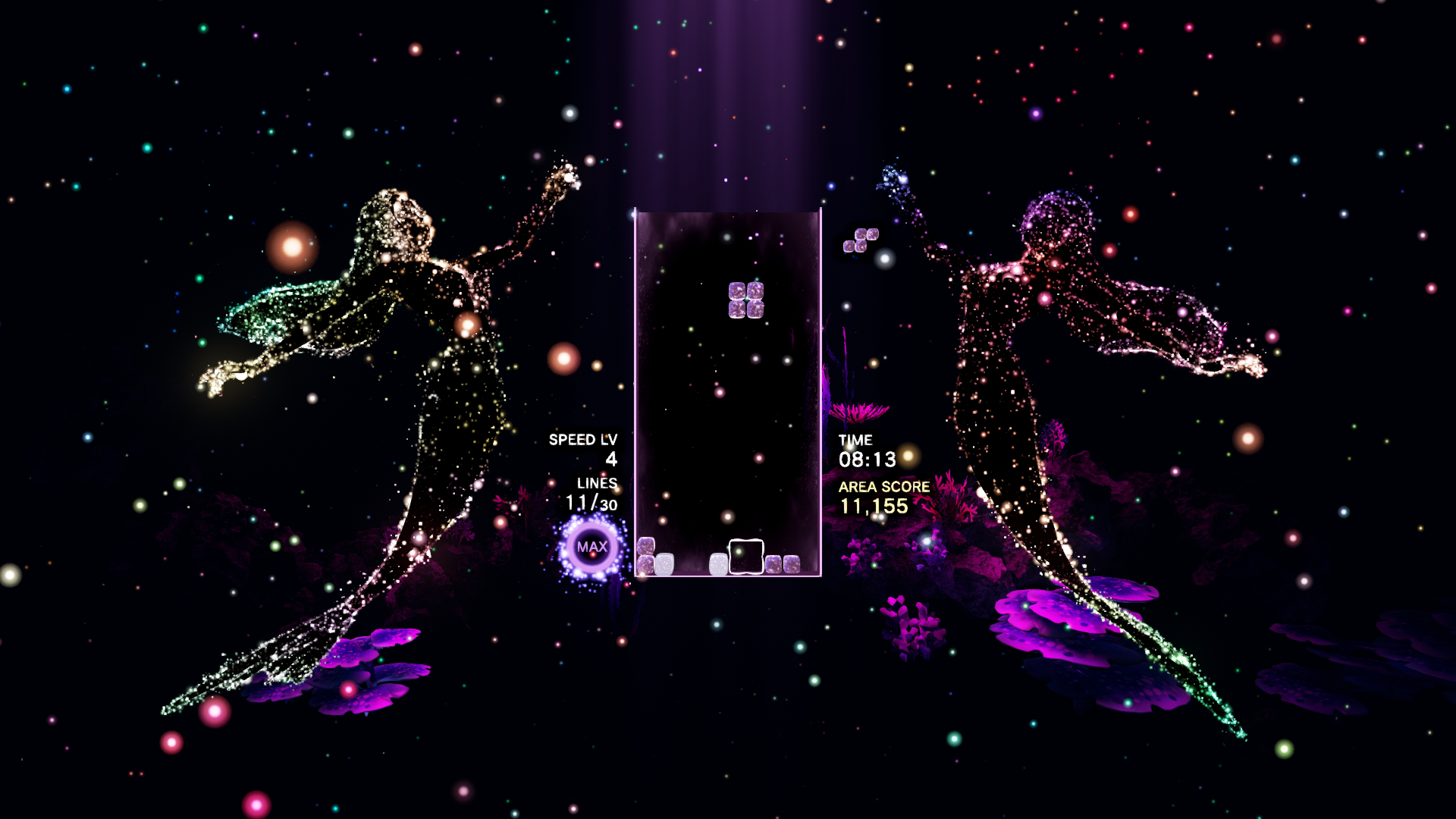
Even as a professional writer, I’m not sure if I would be as bold and hyperbolic to claim that Tetris Effect saved me, but it's an anchor in part of my life that feels like a foggy sea. Then and now, the audio-visuals of Tetsuya Mizuguichi’s magnum opus. For me, at least, it’s the perfect game. Proof of both Tetris’ place as a transcendental experience and its representation of synesthesia as an observable phenomenon.
All of this is to say, Lumines Arise kinda had a lot to live up to in my head.
No matter how much I could try to distance myself from this game’s spiritual predecessor, there is no way that my impressions of this game won’t be massively skewed. So I don't know, if you are looking for “An Objective Review”, you certainly aren't going to get that here.
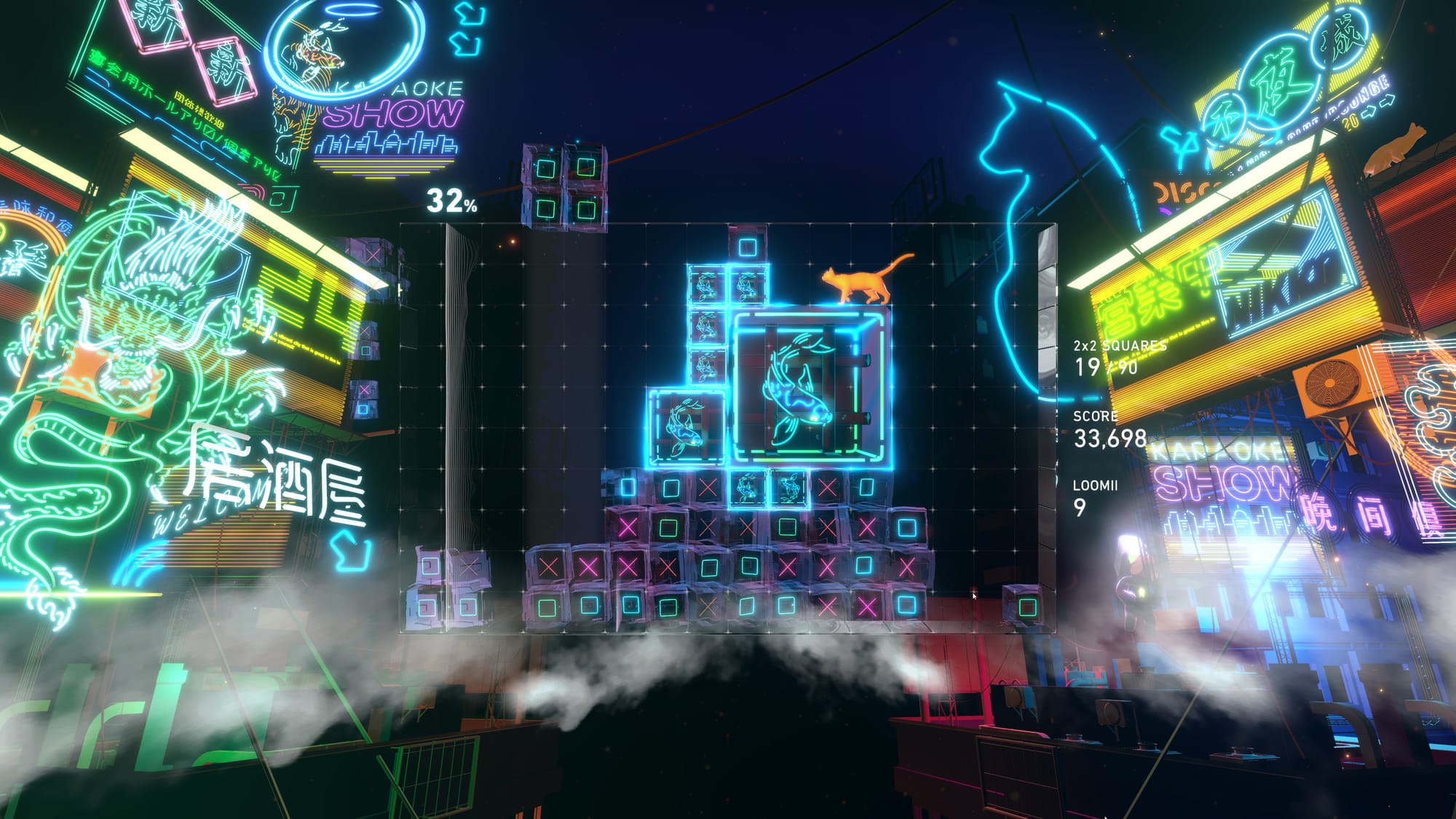
2025 has been a really rough year for me. Without even considering the general state of the world, I have been contending with the directionlessness that comes with exiting college into a media landscape that is *gestures at the state of games journalism*. That paired with a continued and seemingly never-ending fight to access gender-affirming care has led to a general feeling of malaise in my life and apathy towards a world that seems pretty content to make good people miserable. This rut I have found myself stuck in has rubbed up adjacent to my raging against the passage of time as I try to make the most of my time left with ailing family members. The result is near constant turmoil brought about by wanting to escape this point in my life, but the cruelty of time only flowing one direction means progressing to a stage of life that will undoubtedly be filled with more pain. In short, things have sucked.
Life has an ebb and a flow that repeats, and it seems that part of that rhythm for me is that in moments when I struggle, I anchor myself to a new life-affirming game about falling blocks. Arise itself feels like another stanza in a rhyming poem in that regard, considering the first Lumines is said to be a puzzle game designed as a stand-in for Alexey Pajitnov’s classic when Mizuguchi couldn't acquire the Tetris licence in 2004 to create a musical mash-up for the PSP launch. Years later, Tetris Effect then, in turn, felt like an accumulation of the lessons learned from several Lumines games, the production values of Rez and Children of Eden, and the long-awaited Tetris licence. Finally, the loop seems to be closing off. Lumines Arise acts as a spiritual successor to a Tetris game, which is a spiritual successor to the Lumines series, which owes its own existence to the ghost of a Tetris game that never was.
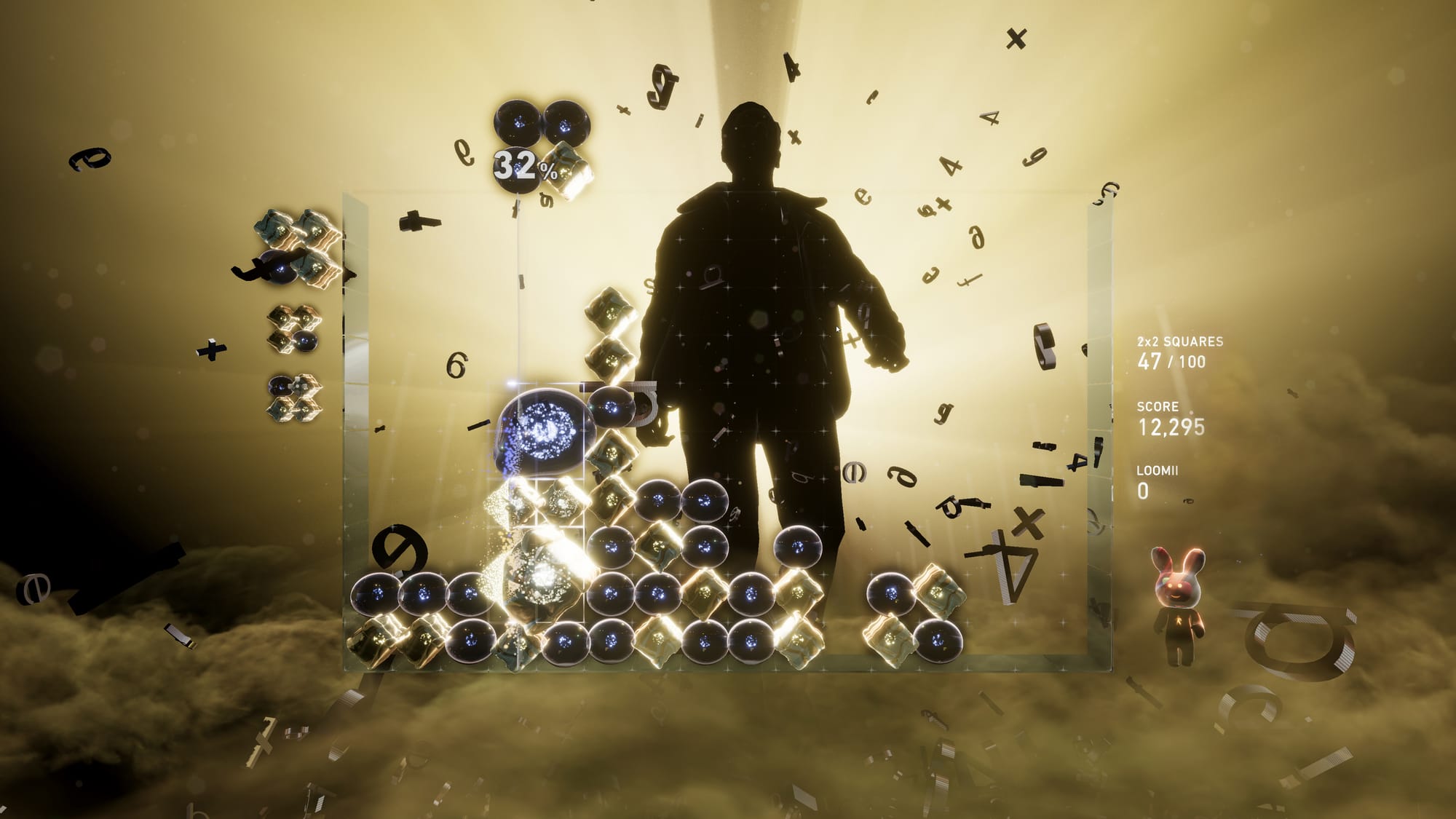
If Tetris Effect takes the perfect game and makes it transcendental through the use of music and visuals, Lumines takes a great but flawed game and makes it equally stunning. In some ways, that is much more impressive.
If you're unfamiliar with Lumines' gameplay, I'll save us some time and recommend you watch 30 seconds of gameplay, to go along with this. Otherwise, this will be hard to visualise. To recap for everyone who hasn't played since the PSP; you are still dropping 2x2 blocks made up of four square panels in one of two colours, trying to form 2x2 blocks of a single colour. You can interlink multiple 2x2 blocks to multiply your score. So a 2x3 block of one colour is worth two 2x2 blocks, and a 3x3 block is worth four of them. These blocks remain on the matrix until a line that sweeps from left to right across the screen in beat to the music clears them. You have to prevent blocks from hitting the top of your matrix while trying to extend your multiplier by setting up combos. In some ways, it's a more complex puzzler than Tetris, and that has not always been to the series' benefit.
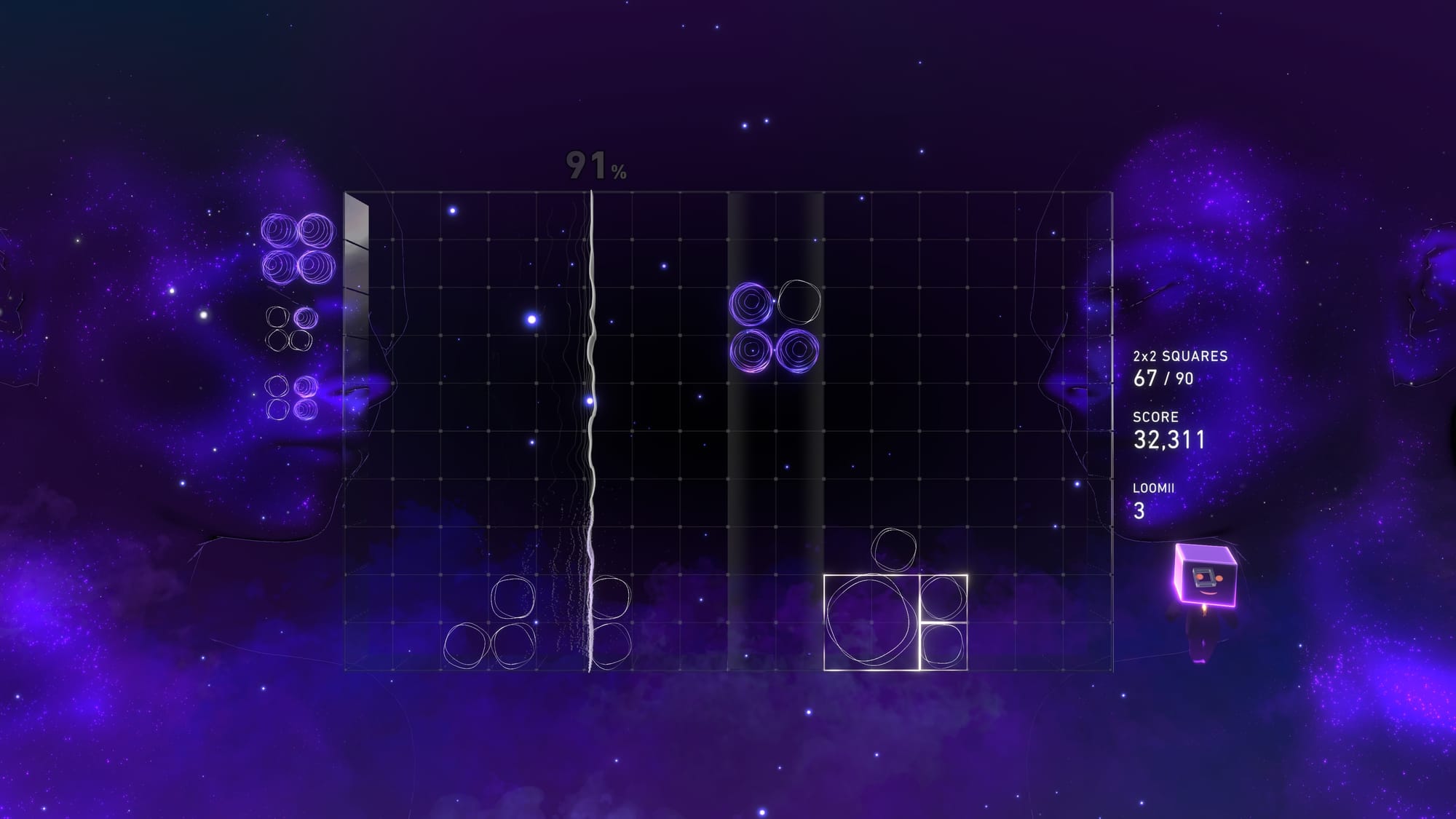
One of the things that's held back Lumines over the years is that, unlike Tetris, it often feels like some people just get it and some just don't. Tetris creates an elasticity in the human brain that has been observed by scientists, and while Lumines was a great puzzle game, it didn't inspire the same fluid thinking. As a result, I know many people who “just never could get a grip on Lumines.” All previous Lumines games have had difficulty humps that progressed alongside clearing stages, but it was mostly a linear increase in challenge. Arise learns from Effect by realising that sometimes the most valuable tool in making a game feel like second nature is by sometimes ratcheting down the difficulty for a moment. It's a piece of advice that any high-level Tetris player will give you. Crank up the speed and gravity to the max for a while, and even if you get your ass kicked, when you go back down to a normal starting point, it will feel like you have taken training weights off.
Tetris Effect built this technique into its pacing, often letting difficult levels in its Journey Mode be followed by much more laid-back ones. After the ever-increasing speed made your matrix a mess of uncleared blocks, things would slow back down again, and you could reassess and gather yourself. Accordingly, when playing Tetris Effect, your brain quickly starts to recognise the best way to clear cluttered lines when things slow back down, and you take that knowledge forward the next time things speed up, until it becomes reflexive. Basically, Tetris Effect is really good at letting you save your own ass and improve at the same time.
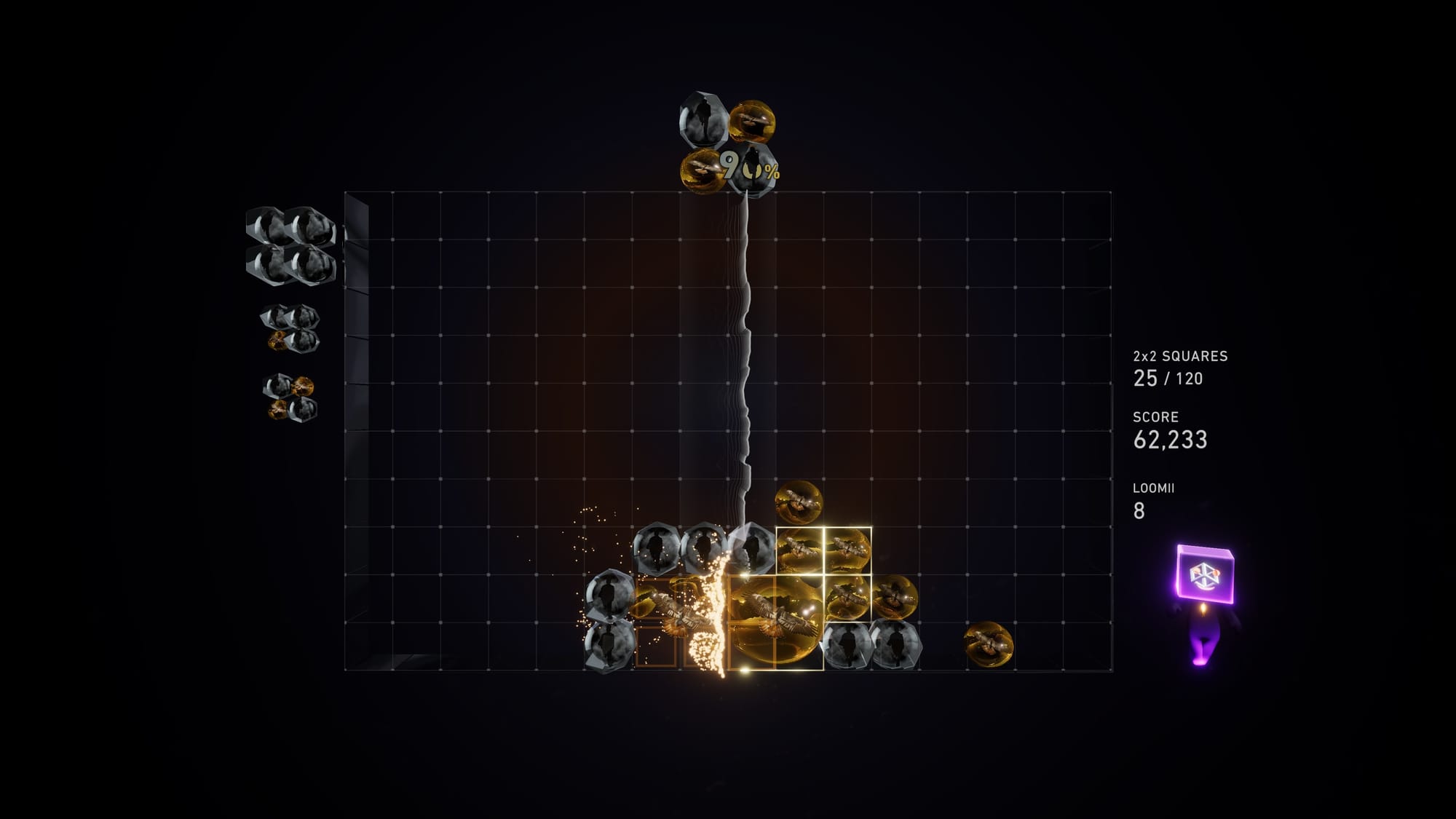
Lumines Arise expands on this concept through two key ways. Firstly, in Tetris, there are two main things that affect the difficulty: speed and gravity. Speed is how fast blocks fall from the sky, while gravity is kind of an aftertouch - it's how much time you can still move your piece after it hits your blocks before it locks into place. Arise adds a third vector, speed and gravity remain (if a bit different in ways, if you really dig into things), while the rhythm of the bar sweeping across the screen actually clearing blocks from your matrix, is the final slider.
This means you can have levels where the blocks might fall slowly, which are great because you can recuperate, but the music is down-tempo. Thus, the line moves slowly, and you can still end up with a cluttered screen. It allows for a much more expressive difficulty curve. Some down-tempo stages are still challenging, and sometimes you’ll be begging for things to speed up as a result. These three modifiers diversify the actual pacing of the gameplay, and it's likely why Arise has a lot more stages and themes than Tetris Effect. There are simply more types of moments to match music and visuals to, be it a busy kitchen, manic giant geckos, a quiet endless view into space, or calming beachfronts with an ever-rising tide.
The second way that Lumines makes you better at the game – and in turn more likely for you to give yourself over to its way of required thinking – is through what I've dubbed its “saviour mechanics.” One of these has been in the series from the start, and it sees a 2x2 with a special glowing square of one colour fall. Match this glowing square to a square of the same colour, and it doesn't matter if they form a 2x2 block; the line will clear them. What's more, this property is infectious, meaning that neighbouring blocks of a single colour that don't form a square can all be cleared if they are touching.
The other saviour mechanic is new, and is much more akin to the Focus Mode in Tetris Effect. In that game, this mode stops time for a brief moment and allows you to carefully pick out lines to clear, adding them to the bottom of your matrix so they can all be added up together once the Focus ends. Arise has Burst Mode, which is similar on its face but a bit more complex. It does, similarly, stop blocks from falling. However, if you create, let's say, a blue 2x2 block, it will throw any, let's say, red squares touching it off-screen entirely. The same thing goes if you create a 3x3, 4x4, and so on. When the burst ends, the red square will, in turn, all crash back down into the matrix in lines they at one point inhabited and create a second, often huge, combo.
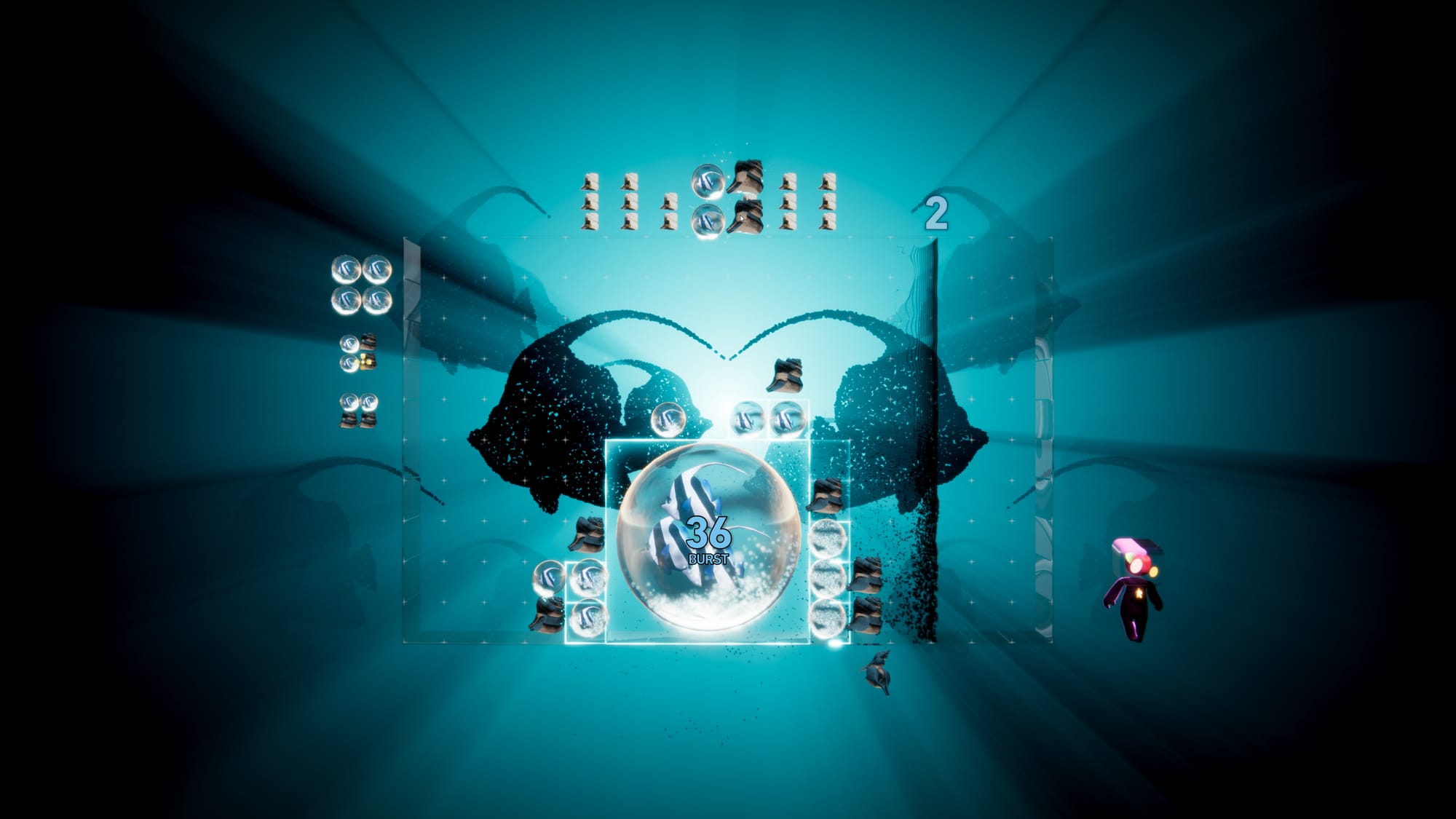
This is Lumines Arise’s secret weapon. These two saviour mechanics, especially if paired together, create incredible moments where you save yourself from certain defeat and give you are near-fresh board to work with. This comes in extra handy as, like Tetris Effect, Lumines’ journey is made up of levels with several connecting stages. However, once you clear them all, you can unlock Survival Mode, which chains every level and stage together into an at least two-hour marathon. This will be your best moment with Lumines.
After the Journey Mode, and its clever inter-stage pacing has built up your muscle memory and reflexes. When you are 90 minutes into a Survival gauntlet. The squares are building up faster than you can deal with them. Right before you push yourself into oblivion. Lumines gives you the tools to save yourself. To take a moment from the chaos and constant torment of this endless puzzle to clear your matrix and reassess everything.
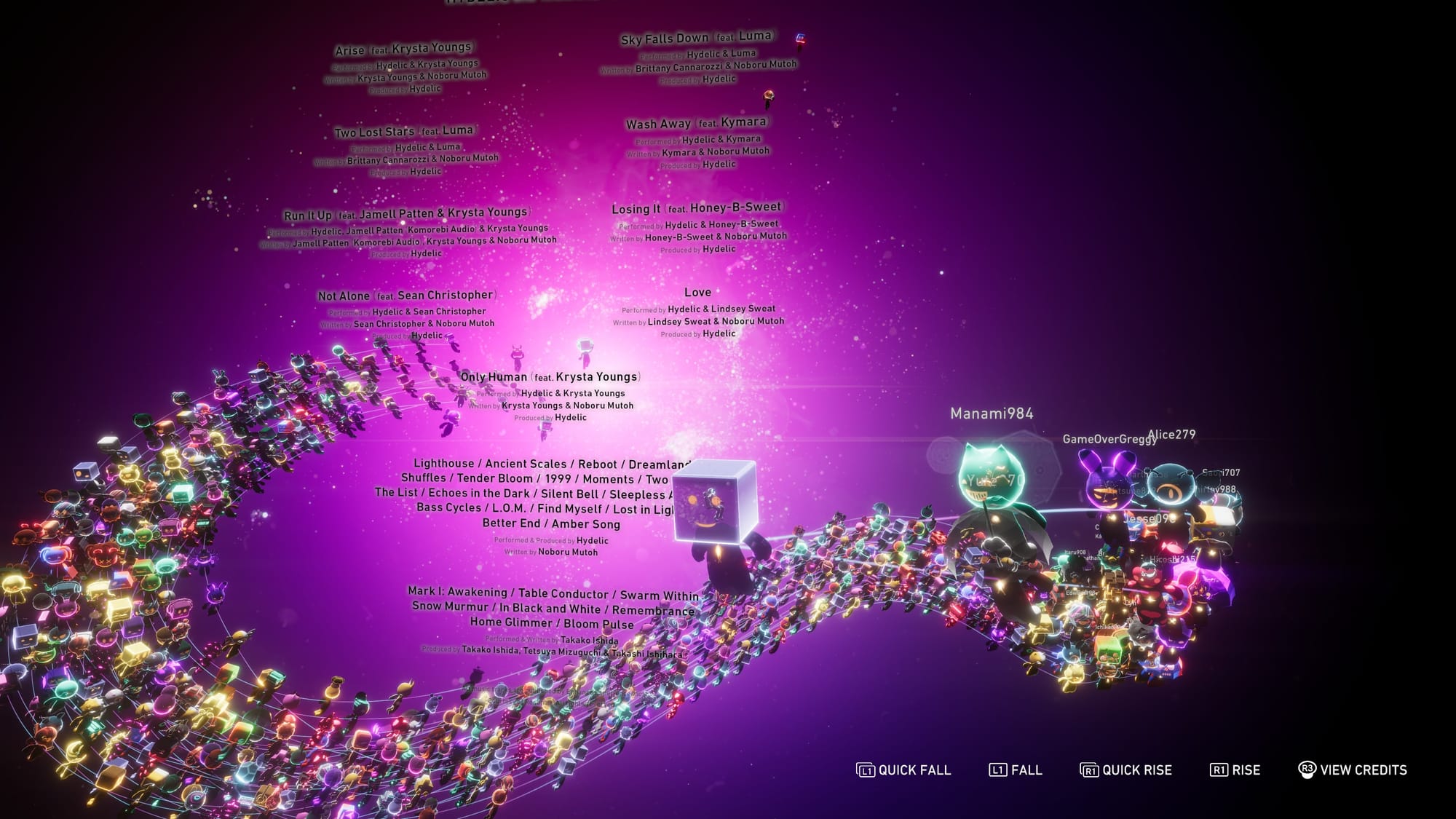
Lumines, in the end, will culminate in a stage and musical track reminding you once again that you are human, and you are here, right now.
I realise as I write this that it's little wonder these games have become anchors in my life when I needed them the most. The rhymes of synesthesia seemingly echo the rhymes of life. And that is a pretty remarkable thing to capture in a little puzzle game about falling blocks.
10/10
Lumines Arise was reviewed on PS5, and a review code was provided by the publisher. It's also out on November 11 on PC.
Rewinder uses a 10-point scoring scale in our reviews, and we've detailed our review scoring policy here for more information.




Comments ()